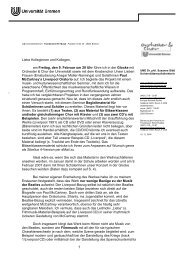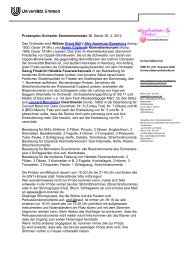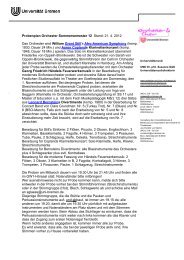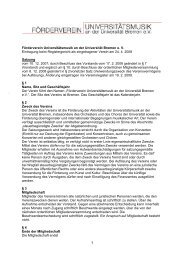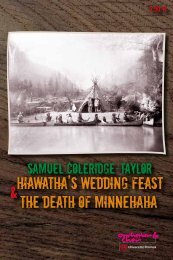Booklet - Orchester & Chor der Universität Bremen
Booklet - Orchester & Chor der Universität Bremen
Booklet - Orchester & Chor der Universität Bremen
Erfolgreiche ePaper selbst erstellen
Machen Sie aus Ihren PDF Publikationen ein blätterbares Flipbook mit unserer einzigartigen Google optimierten e-Paper Software.
15 Im Süden Namibias wird von den Nama<br />
und Damara eine Sprache aus <strong>der</strong> Familie<br />
<strong>der</strong> Khoisan-Sprachen mit Klickslauten<br />
gesprochen: !, /, ≠ und //. Alle vier folgenden<br />
Lie<strong>der</strong> sind in dieser Sprache. Angeleitet von<br />
Nama/Damara-sprachigen Mitglie<strong>der</strong>n des<br />
<strong>Chor</strong>es <strong>der</strong> University of Namibia und auf<br />
den langen Busfahrten durch Namibia hat <strong>der</strong><br />
<strong>Chor</strong> <strong>der</strong> Universität <strong>Bremen</strong> intensiv und mit<br />
großem Vergnügen die korrekte Aussprache<br />
immer wie<strong>der</strong> probiert.<br />
Im ersten Lied, „Ti mamasa”, wird <strong>der</strong><br />
Zug thematisiert, von dem die in <strong>der</strong> Zeit<br />
<strong>der</strong> Apartheid Exilierten hofften, dass er<br />
sie möglichst bald wie<strong>der</strong> nach Hause<br />
zurückbringen möge.<br />
In the south of Namibia, the Nama and<br />
Damara speak a language from the family<br />
of Khoisan-languages with click sounds: !,<br />
/, ≠ and //. The four following songs are<br />
performed in this language. With the help of<br />
the Nama/Damara-speaking members of the<br />
choir of the University of Namibia and during<br />
the long bus rides through Namibia, the<br />
choir really enjoyed to practise their correct<br />
pronounciation.<br />
The first song “Ti mamasa” deals with the<br />
train of which the Namibians living in exile<br />
during the time of apartheid hoped that it<br />
would bring them back home.<br />
“Ti mamasa ta ge kaise ra mû ≠gao” –<br />
Nama, arr. v. Niels Erlank und Hans A. Eichab<br />
– aus Namibia<br />
Ti mamasa ta ge kaise ra mû ≠gao.<br />
Tsūkū tsūtū tis ge ≠nūkunisa ra mi<br />
Ti mama ti mama ti mama ti mama<br />
16 „!Gawigu“ ist eine Hymne an die namibische<br />
Hafenstadt Swakopmund (Swakop = Tsoaxaub).<br />
Marcellinus M. Swartbooi engagiert sich als Komponist<br />
dafür, dass auch heute weiterhin neue Lie<strong>der</strong> auf Nama<br />
komponiert werden.<br />
“!Gawigu“ is a hymn for the Namibian harbour city<br />
Swakopmund (Swakop = Tsoaxaub). Marcellinus M.<br />
Swartbooi actively engages himself as composer for the<br />
perpetuation of composition of new songs in Nama.<br />
„!Gawigu“ – Nama, komp. v. Marcellinus M. Swartbooi<br />
(2004) – aus Namibia<br />
!Gawigu xa ra /â/â-he, /â/â-he, /â/â-he<br />
Sores xara ≠nâ≠nâhe, ≠nâ≠nâhe, ≠nâ≠nâhe<br />
/Gowagu //aegu, //aegu, //aegu sâube he hâ, sâube<br />
he hâ<br />
Huris ge tsekoro bera !gūaisi<br />
Tsoaxaub Tsoaxaub Tsoaxaub amse



